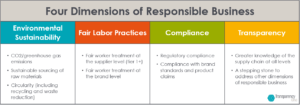 In response to consumer demand for more “responsible” products, businesses have made commitments to ensure their supply chains are sustainable and ethical. But these terms have varied interpretations. What does it mean for a business to be “sustainable”? What constitutes “ethical” practices? What makes a business responsible? We take a look at four important dimensions of responsible business: environmental sustainability, fair labor practices, compliance, and transparency.
In response to consumer demand for more “responsible” products, businesses have made commitments to ensure their supply chains are sustainable and ethical. But these terms have varied interpretations. What does it mean for a business to be “sustainable”? What constitutes “ethical” practices? What makes a business responsible? We take a look at four important dimensions of responsible business: environmental sustainability, fair labor practices, compliance, and transparency.
Environmental Sustainability
Environmental sustainability is what many consumers first think of when it comes to a responsible or ethical product. Environmental sustainability is defined by the UN as “responsible interaction with the environment…to avoid depletion of natural resources, ensuring long-term environmental quality.” Aspects of environmental sustainability include:
- CO2 and greenhouse gas (GHG) emissions
This typically refers to a business’ emissions, namely from their own facilities, suppliers’ facilities, or due to transportation. Corporate commitments for reduced emissions may involve becoming carbon neutral, increasing use of renewable power, or achieving science-based emissions targets. To date, 23% of Fortune Global 500 companies have made such a commitment. Examples include REI, Amazon, and Danone, among many others. - Sustainable sourcing of commodities
Sustainable sourcing refers to how a product’s raw materials were sourced. While this can be applied to virtually any raw material, commodities of high interest today include palm oil, cocoa, cotton, conflict minerals, and seafood due to their association with practices such as deforestation, excessive water usage, and overfishing. Sustainable sourcing aims to address environmental issues like biodiversity, global warming, and pollution in addition to social concerns like safe working conditions and diversity. To ensure their raw materials are sustainably sourced, businesses often implement requirements that suppliers must adhere to, such as certifications or specific farming practices (e.g. regenerative agriculture). - Circularity
According to the Ellen MacArthur Foundation, a “circular economy is based on the principles of designing out waste and pollution, keeping products and materials in use, and regenerating natural systems.” Circularity is a broad concept that involves multiple actions like recycling, waste reduction, reuse, and product innovation. Circularity is a particularly hot topic in the fashion industry, with many companies making commitments to incorporate recycled materials into their products, source certain materials (like cotton or viscose) sustainably, reduce waste, and invest in innovative product design and fabrics to support multiple lifecycles.
Fair Labor Practices
Fair labor conditions—that workers are of an appropriate age, are working voluntarily, are paid fairly, and have reasonable working hours—is another dimension of responsible business that addresses the human side of supply chains.
 Fair worker treatment at the supplier level
Fair worker treatment at the supplier level
Consumers want to know if the workers involved in the production process were treated fairly. This includes a range of conditions including fair wages, documented terms of employment, protection of worker safety, and the ability to join trade unions. While the need for fair worker treatment applies to all industries, the fashion industry in particular is under increased pressure due to the Rana Plaza collapse in Bangladesh in 2013 and heightened consumer concern about fast fashion. Importantly, companies should take steps to assure ethical treatment of workers at all levels of their supply chain, not just the immediate tier. Many certifications and regulations exist to help businesses demonstrate proper working conditions, such as the UK Modern Slavery Act. Businesses can also establish and implement their own labor policies and requirements.- Fair worker treatment at the brand level
While fair worker treatment has traditionally focused on the supplier level, there is an increased demand to ensure ethical treatment at the brand level. Accounts of unethical and racist treatment of employees have come to light in recent weeks, leading consumers to boycott certain brands. Consumers are calling upon businesses to ensure diversity among employees, including at the executive level, as well as equitable treatment of Black, Indigenous and People of Color (BIPOC) employees. Fair worker treatment is quickly becoming necessary at all tiers of the supply chain, even those that we typically assume to be ethical.
Compliance
While compliance may not be top of mind for many consumers seeking sustainable or ethical goods, it is a critical dimension of responsible business.
- Regulatory compliance
Several regulations exist to assure the safe and responsible use of materials like hazardous chemicals and conflict minerals (e.g. RoHS and REACH in the EU, the Toxic Substances Control Act and Dodd-Frank Act in the US). Other regulations like the California Transparency in Supply Chains Act, the UK Modern Slavery Act, and France’s Devoir de vigilance require businesses to increase transparency, disclose more information about their supply chains, and respect human rights and the environment. Regulatory compliance is essential for any business proclaiming ethical and responsible practices. - Compliance with product claims
To maintain credibility, businesses must also ensure their products align with their stated brand values and product claims. Responsible businesses will take steps to verify the accuracy of their claims, whether this be 100% vegan or organic, guarantees of fair worker treatment at the farm level, use of recycled materials, etc. Backing up product claims with real, verified data requires significant legwork on the company’s part, but doing so demonstrates a commitment to responsible sourcing that goes beyond product labels.
Transparency
Finally, supply chain transparency is a crucial aspect of responsible business. Companies who value corporate responsibility take proactive steps to improve understanding of their supply chains and increase visibility at all levels, to ensure ethical practices across all dimensions of responsible business.
It is important to keep in mind that transparency itself is not the end goal. Rather, it is a first step to ensure that products are made in a way that is sustainable, socially responsible, and compliant with regulations and marketing claims. Without transparency, responsible business cannot exist.
How to become a responsible business
 Becoming a responsible business begins with a specific initiative for a specific product. As a first step, it is important to focus efforts on the highest priority issues for your industry and supply chains, such as sustainable sourcing of palm oil, fair worker treatment at tier 1 factories, or compliance with conflict mineral regulations. Eventually, as responsible practices become embedded into the business, efforts can be scaled to ensure all products meet responsible sourcing requirements.
Becoming a responsible business begins with a specific initiative for a specific product. As a first step, it is important to focus efforts on the highest priority issues for your industry and supply chains, such as sustainable sourcing of palm oil, fair worker treatment at tier 1 factories, or compliance with conflict mineral regulations. Eventually, as responsible practices become embedded into the business, efforts can be scaled to ensure all products meet responsible sourcing requirements.
At Transparency-One, we help businesses at all stages in their responsible sourcing journey. Our solution enables companies to increase supply chain visibility and engage with suppliers to meet specific corporate initiatives, then scale up when ready to ensure responsible practices across the business as a whole. This journey takes time, resources, and dedication, but results in a company that fully embodies all four dimensions of responsible business.
Did you like this article? Follow Transparency-One on Twitter and LinkedIn.










